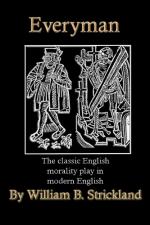|
This section contains 290 words (approx. 1 page at 400 words per page) |

|
Everyman Summary & Study Guide Description
Everyman Summary & Study Guide includes comprehensive information and analysis to help you understand the book. This study guide contains the following sections:
This detailed literature summary also contains Bibliography on Everyman by Anonymous.
Everyman was first published in England early in the sixteenth century. This English play is now thought to be based on an earlier Dutch play, Elckerlijc, published in 1495. It is unknown if Everyman was ever staged in the era in which it first appeared. The title page states "Here begynneth a treatyse." This implies that the text may have been intended as reading material. Frequently, authors composed a treatise containing dialogue to create an additional emphasis on an idea, in this case a preparation for God's judgment. Such works were often created without any intention of performance. This may be true for Everyman; however, even if it was not performed, it is clear that the text was very popular, since there are four separate editions from the first half of the sixteenth century that have survived to this day. Frequent reprintings indicate that the text was bought and read a great deal, if not performed.
Although none of the characters in Everyman have any depth, the influence on later drama is especially clear when readers compare the medieval character archetypes with those created for Elizabethan drama. Christopher Marlowe's Dr. Faustus is often cited as an example of how the medieval morality play influenced later theatre. Marlowe's characters would be easily recognizable to anyone who had read Everyman. There is also the same emphasis on worldly goods and on knowledge. But Marlowe takes the ideas in Everyman even further and argues that even knowledge can be perverted. But the same idea that man can seek forgiveness and salvation through contrition still appears. Everyman is considered one of the most accessible of the medieval morality plays because the language is closer to modern English and the story is clearly told.
Read more from the Study Guide
|
This section contains 290 words (approx. 1 page at 400 words per page) |

|



